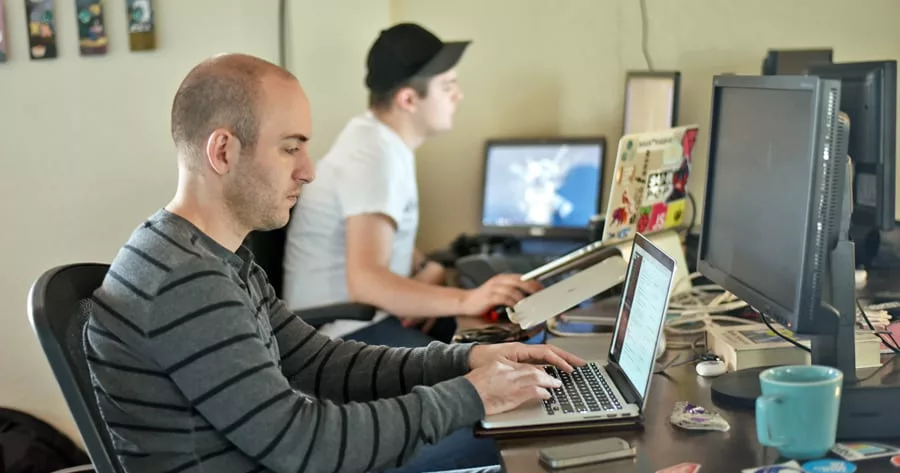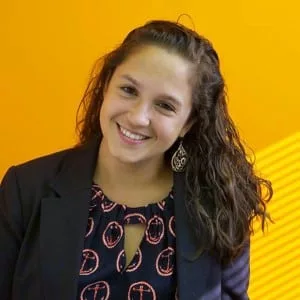
Home » Software development firm Wildland embraces rapid growth
Software development firm Wildland embraces rapid growth

April 14, 2016
Wildland, a software development agency in Richland, is young, but its all-star team of programmers, designers, and project managers have taken on ambitious projects and the company is growing at a steady rate.
[blockquote quote="We’re always looking for partners who want to get a software to market, but don’t have the technical talent to do so." source="Ty Mulholland, president of Wildland" align="right" max_width="300px"]
Wildland started two years ago as a two-person web development firm working with small to medium-sized businesses. Founders Ty Mulholland and Herb Collingridge started off as one of the founding members of the Fuse co-working space in Richland, and within the last year the firm has grown from a team of just two to a team of 11. At the same time, the company’s focus has shifted from strictly web design to application, software and database development.
Ty Mulholland, president of Wildland, said when the company changed its corporate structure two and a half years ago, it also turned its focus to creating software.
“Our group is 11 people right now and we’ll probably continue to grow throughout the year to be able to keep up with projects,” Mulholland said.
In February, Wildland was recognized at the Richland Rotary Club’s 2016 Entrepreneurial Awards. The awards acknowledge fast-growing new businesses doing their part to develop the local creative and technology economy.
“When we started, we had one of those meetings where we asked ourselves what we wanted this to be, and I said I’d like to have ten people and I’d like to do software,” Mulholland said. “But I didn’t know how to get there and without some of the key relationships we’ve built, I don’t think we would be there.”
Wildland is championing an innovative new business model. With the technical capital equity model, Wildland provides technical talent to startups at a reduced rate in exchange for an equity stake in the company.
It’s a win-win for both Wildland and entrepreneurs hoping to materialize their vision, while foregoing the cost of hiring and managing an engineering team. The model is enticing to entrepreneurs who need to prove their technology startup works but can’t hire people to build it.
“We’re always looking for partners who want to get a software to market, but don’t have the technical talent to do so,” he said. “What we’re trying to do is create viable partners that are invested in seeing the product succeed.”
The model is not entirely new. Several software engineering firms have used the model. Mulholland said the most successful is based in San Francisco, Calif. Although innovative, the new model of doing business can be difficult to manage.
“You have to be able to cover your costs while not allowing a huge risk to pull the company down, and that’s why we balance the work we do under the equity model with service type work,” Mulholland said. “We can only take a certain number of equity deals a year.”
Some of its projects like Denovo and Distilltech were produced under that model.
Denovo is law case management software, which is now in its beta stage, that helps law firms streamline daily administrative and legal duties. It offers features like automated document generation, client conflict checks, and time tracking. Mulholland said the software might be ready to go to market in a coupled of months.
Distilltech is an inventory management software that allows users to track the progress of their spirits from wheat to bottle and allows distillers to receive and manage feedback from consumers.
“We’re also working on several service projects from mapping software, to inventory management software, to application development,” Mulholland added.
His philosophy on building software is simple: push meaningful code.
For Wildland, that means building software with the purpose of adding value, changing people’s workflows, and improving efficiency — not just building an arbitrary piece of software.
And that philosophy is working for the company.
“The nice thing is watching how fast it’s happened,” Mulholland said. “Watching how amazing the team is — we see the next two to three years as the sky's the limit. We can do whatever we want and that’s really exciting.”
As one of the founding members and main occupants at Fuse, Mulholland realizes that it owes a lot to key connections he formed because of his membership in the coworking space. In turn, Mulholland tries to give back by helping foster a larger entrepreneurial ecosystem in the Tri-Cities.
“We want to be able to keep and develop local technical talent here to make Tri-Cities better and I think that’s what we’re doing, we love the Tri-Cities and we want to see it prosper,” he said. “Our biggest motivator is creating a company where people like to work.”
For more information on Wildland visit wild.land.
Local News Information Technology
KEYWORDS april 2016





